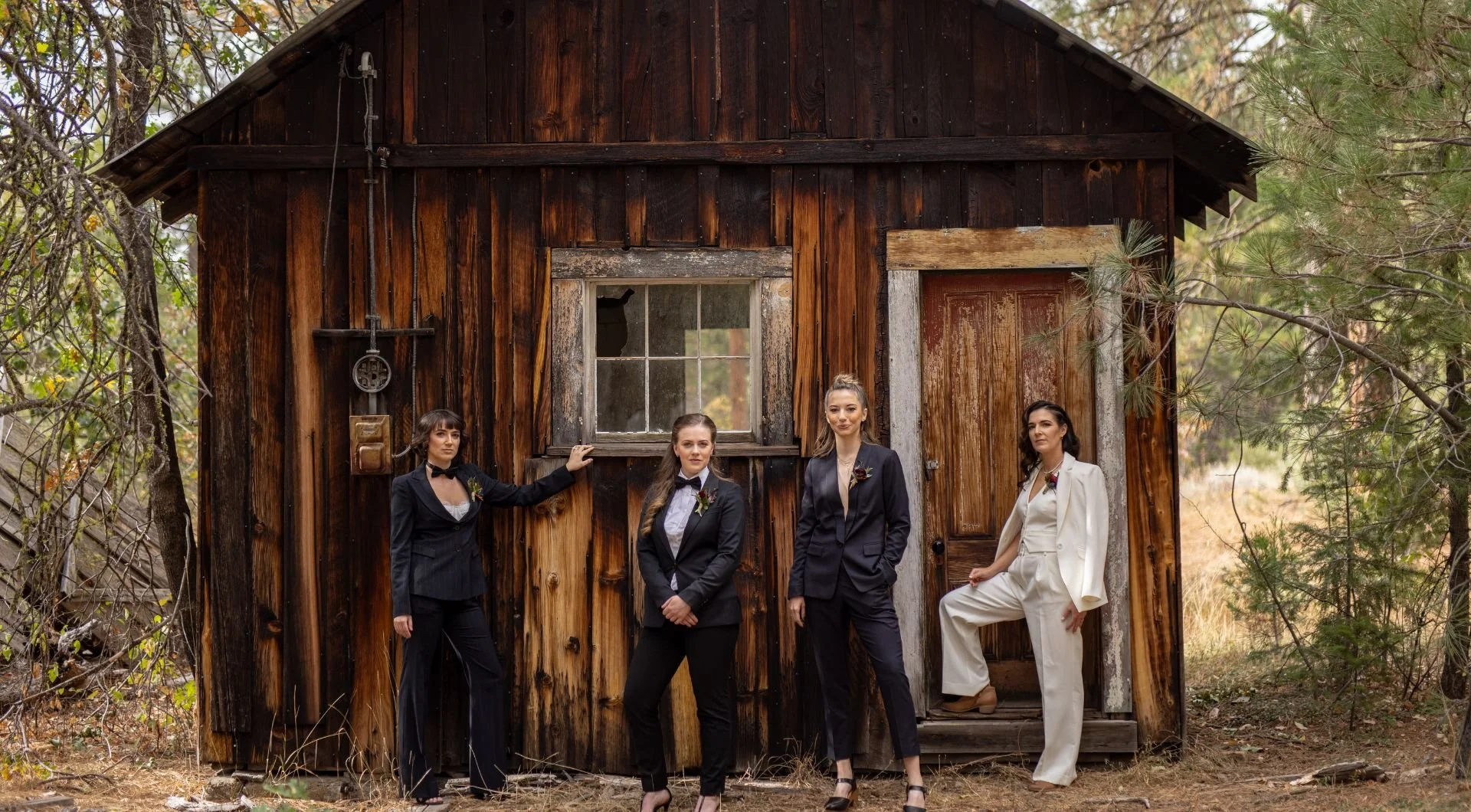What Is Considered a Destination Wedding? The Insider’s Playbook
The Pinterest board is overflowing, the guest list is growing, and the budget spreadsheet is starting to look…ambitious. You and your partner are dreaming of something more intimate, more meaningful — maybe somewhere in nature, away from the noise and expectations. But does that mean flying to Italy? A remote island? Or could it be somewhere closer, tucked into the mountains, where everything you need is already waiting?
As couples rethink what their ideal wedding looks like, many find themselves asking the same question: What exactly counts as a destination wedding?
This article explores what a destination wedding truly is — beyond the stereotypes — and how the right setting can transform your celebration from stressful to unforgettable.
What Qualifies as a Destination Wedding?
A destination wedding is any wedding held in a location away from the couple’s hometown, typically requiring travel for most guests. It’s not limited to tropical resorts. It can be a mountain retreat, vineyard, or secluded eco-estate.
While many people picture palm trees and passports when they hear “destination wedding,” the reality is much broader — and far more personal. What truly defines a destination wedding is the act of gathering loved ones in a meaningful place that offers a full experience, not just a ceremony.
Some couples choose far-flung international locales, while others opt for unique destinations within driving distance, like forested retreats or mountain lodges. The key is that the location is intentional, distinct from everyday surroundings, and offers an immersive setting for both celebration and connection.
Whether it’s a quiet ceremony in the Sierra Nevada or a weekend-long event at a coastal estate, destination weddings allow couples to turn their wedding into an unforgettable shared journey, not just a single-day event.
Defining the Distance: How Far Away Is Considered a Destination Wedding?
A destination wedding is typically defined as any wedding held 100 miles or more from the couple’s home. However, it can also refer to weddings in unique or travel-worthy locations, regardless of distance.
The “100-mile from home” guideline is a common benchmark used to define a destination wedding. It implies that the event is far enough to require travel and possibly overnight accommodations for the couple and guests. Still, this definition is flexible. Some couples consider a venue a destination if it offers a sense of escape, uniqueness, or vacation-like experience, even if it’s closer to home.
For example, Northern California is a popular domestic destination. From the vineyards of Napa Valley to the coastal cliffs of Big Sur, it offers stunning backdrops and an immersive experience that feels like a getaway even for couples and guests who live within the state. This blend of accessibility and adventure makes it a prime location for destination-style weddings without needing a passport.
Ready to turn your dream destination wedding into reality? Discover the magic of Northern California at Twenty Mile House — a secluded, all-inclusive retreat perfect for an unforgettable celebration.
Key Differences Between Destination and Local Weddings
When choosing between a destination and a local wedding, couples should consider how each option impacts planning, guest experience, cost, and overall vibe. Here’s a breakdown to help you understand the distinct features of both:
Destination Weddings
Planning scope: Requires coordination from afar, often relying on local planners or resort packages.
Guest travel and accommodations: Guests typically travel long distances and need lodging; travel logistics are a key part of the planning process.
Multi-day celebrations: Commonly span several days with welcome events, excursions, and farewell brunches.
Cost structure and inclusions: May offer all-inclusive packages, but travel and fewer vendor options can increase overall costs.
Guest count/intimacy: Usually smaller, more intimate gatherings due to travel limitations and costs.
Local Weddings
Planning scope: Easier to manage in person with local vendors and venue visits.
Guest travel and accommodations: Minimal travel required; accommodations may not be necessary for most guests.
Single-day event: Typically, a one-day event with the ceremony and reception on the same day.
Cost structure and inclusions: More flexibility in budgeting and vendor choices, though individual costs can add up.
Guest count/intimacy: Larger guest lists are more common, allowing for a broader invite list.
While destination weddings offer a unique, immersive experience with a smaller guest list and built-in celebration atmosphere, local weddings provide convenience, familiarity, and often greater flexibility in planning. The best choice depends on your priorities, budget, and vision for your big day.
Common Characteristics of Destination Weddings
Destination weddings are all about creating a memorable experience in a unique location—often far from home. Whether hosted on a tropical beach, in a mountain lodge, or at a scenic venue like Northern California’s Twenty Mile House, these weddings blend travel, celebration, and intimacy into one unforgettable event.
Travel for Couples and Guests
Travel is one of the defining features of a destination wedding — bringing both challenges and exciting opportunities. For couples, it means coordinating flights, transportation, and accommodations, often from afar. For guests, it may involve extra planning and expense, but it also offers the chance to turn the celebration into a vacation or weekend getaway.
In Northern California, venues like Twenty Mile House offer a balance of seclusion and accessibility. Guests can fly into major hubs like San Francisco International (SFO) or Sacramento International (SMF), then enjoy a scenic drive to the venue.
For even more convenience, Reno-Tahoe International Airport (RNO) is the closest option, just about an hour away, making it easier for guests to arrive relaxed and ready to celebrate.
Weekend or Multi-Day Celebrations
Destination weddings often go beyond just the ceremony and reception, turning the event into a full weekend, or even several days, of celebration.
Couples commonly include welcome parties, group outdoor adventures like hiking or wine tasting, and farewell brunches to create a relaxed, immersive experience.
These extended festivities give guests more time to connect with one another and the couple, making the celebration feel more intimate and memorable.
An Unforgettable Venue
The right venue sets the tone for a destination wedding, with breathtaking scenery like mountains, rivers, or sprawling eco-estates creating an unforgettable backdrop.
While some couples opt for venue-only rentals, which require hiring outside vendors, full-service venues offer built-in amenities and coordination to simplify planning.
Twenty Mile House stands out as an eco-estate venue in Northern California, blending luxury and sustainability with stunning natural surroundings — perfect for couples seeking both elegance and environmental mindfulness.
6 Things To Consider Before You Decide if a Destination Wedding Is Right for You/h3>
Are you passionate about travel and nature? Do you envision a smaller, more intimate celebration with your closest friends and family? Are you excited about blending your wedding day with a vacation experience for both you and your guests?
Destination weddings are perfect for couples who prioritize meaningful moments and unique experiences over traditional formats. Before you decide, consider these six key factors to make sure a destination wedding fits your vision and lifestyle.
#1: Travel Distance
Think about how far you and your guests will need to travel. Is the venue within driving distance, or will most people need to fly?
Longer travel can mean higher costs and more planning, but can also make the wedding feel like a special getaway.
Balancing convenience with the destination experience is key.
#2: Budget Flexibility
Destination weddings often require a higher budget per guest, which is one reason they tend to be smaller and more intimate.
Travel, accommodations, and multi-day events can add up quickly, but knowing your budget early helps guide decisions about guest count, location, and overall experience. With careful planning, you can create an unforgettable celebration that stays within your means.
#3: Vendor Organization
One of the biggest challenges of planning a destination wedding is coordinating vendors from afar, but full-service venues like Twenty Mile House make it easy.
We include a trusted team of experienced vendors, catering, floral, photography, bakery, and DJ, who already know the venue inside and out. This built-in team works together seamlessly, reducing stress and ensuring a polished, cohesive event. While exceptions are sometimes allowed for outside vendors, using the venue’s preferred partners often leads to a smoother, more reliable planning process — especially when you're not local.
#4: Guest Lodging Options
Having comfortable, convenient lodging is essential for a destination wedding — and it’s even better when everyone can stay together.
Twenty Mile House offers 54 onsite accommodations with a required two-night minimum, creating a private, retreat-like atmosphere for you and your guests.
Instead of scattering across hotels, everyone shares the same space, making it easy to connect, relax, and celebrate together all weekend long. It’s more than just a place to sleep. It’s part of the experience.
#5: Extra Activities in the Area
One of the best parts of a destination wedding is turning it into a full adventure, not just a one-day event. In the Sierra Nevada, guests can enjoy everything from river floating and hiking to exploring charming local towns and scenic trails.
Choosing a venue like Twenty Mile House means you’re surrounded by natural beauty and outdoor fun, giving you and your guests the chance to unwind, connect, and create lasting memories beyond the ceremony. Think of your wedding as a multi-day celebration — with built-in adventures to match.
#6: Transportation Options
For local or regional guests, driving to the venue is often a simple option, especially with clear directions and ample parking. For those flying in, airport access (like nearby Reno-Tahoe International) makes travel manageable with a bit of planning.
No matter how guests arrive, the key is to give them plenty of advance notice so they can book flights, arrange car rentals, or coordinate carpools. Thoughtful planning around transportation helps ensure everyone arrives relaxed and ready to celebrate.
Plan Your Destination Wedding in the Sierra Nevada Mountains With Twenty Mile House
If you're dreaming of a wedding surrounded by towering pines, flowing rivers, and the peace of nature, Twenty Mile House offers the perfect blend of beauty, convenience, and sustainability. With all-inclusive packages, trusted vendors, and cozy onsite lodging, it’s more than just a venue — it’s a full destination experience.
Start planning your destination wedding in California in the heart of the Sierra Nevada mountains today.






